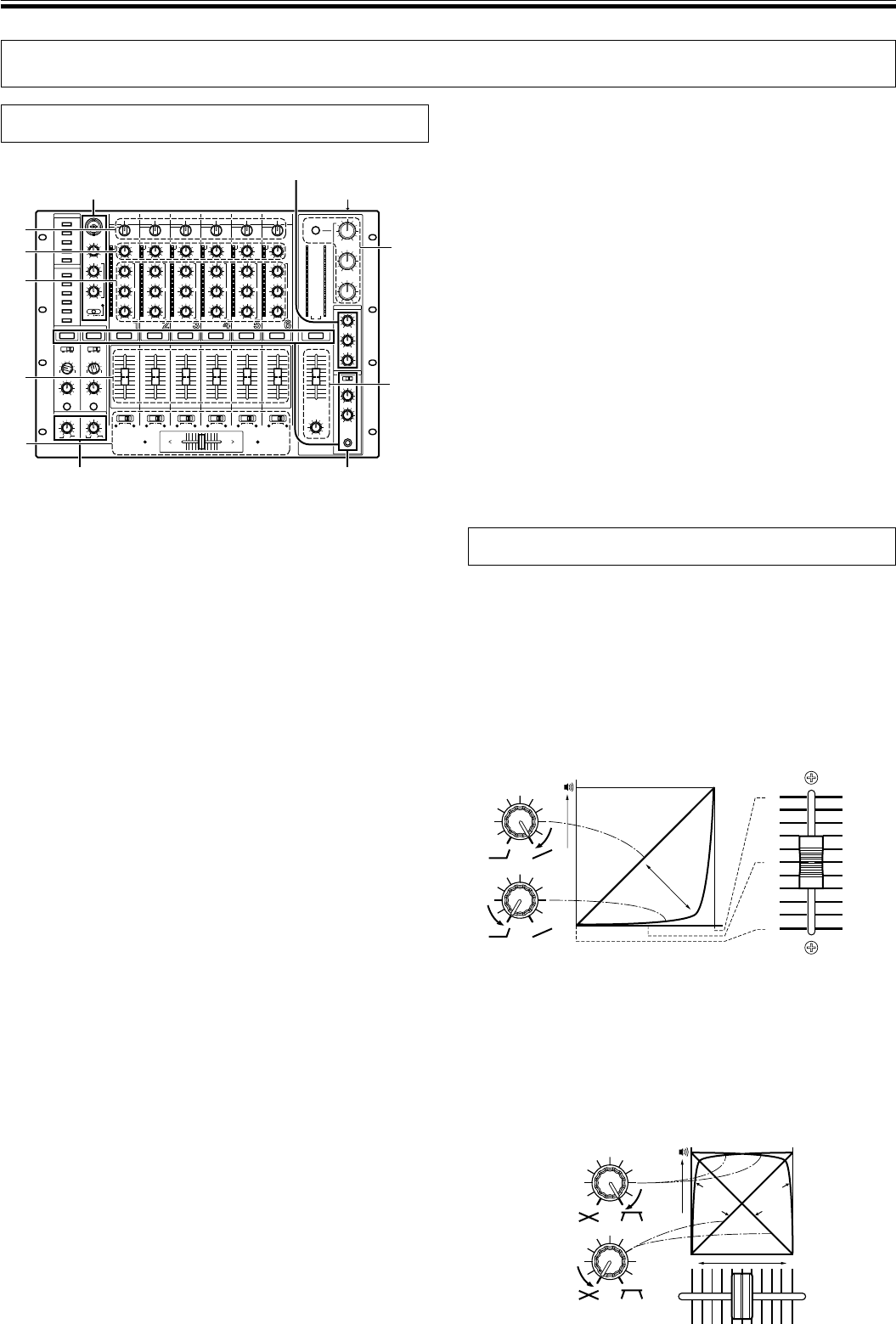
13
OPERATIONS
1. Set the POWER switch located on the rear panel (con-
nection panel) to ON.
2. Set the input selector switches for the channels used to
the devices connected to those channels.
3. Use the TRIM dial to adjust the input level.
4. Adjust the tone using the EQ dials (HI, MID, LOW).
5. Adjust the volume of the channel with the channel fader
slider.
6. When cross fading between channels, use the CROSS
FADER ASSIGN switch to choose between channel [A] and
channel [B] of the cross fader, and operate the cross fader.
÷ When not using the cross fader, choose [THRU] with the
CROSS FADER ASSIGN switches.
7. When using the isolator, switch the MASTER ISOLATOR
button ON, and adjust the level of each bandwidth with
the MASTER ISOLATOR dials (HI, MID, LOW).
÷ The MASTER ISOLATOR button will light when switched
ON.
8. Use the MASTER fader slider to adjust the overall
volume, and adjust the left and right volume balance by
using the MASTER BALANCE dial.
[Main microphone input]
1. When using the main microphone, either set the MIC
selector switch to [ON] or set to [TALK OVER].
÷ When set to [TALK OVER], the output of all sound except for
the main microphone audio is attenuated 20 dB when a
sound higher than –15 dB is input to the main microphone
input.
2. Adjust the volume with the MIC LEVEL dial, and adjust
the tone with the MIC EQ dials (HI, LOW).
[Booth monitor output]
1. Adjust the volume with the BOOTH MONITOR dial
(LEVEL).
÷ The volume can be adjusted with the BOOTH MONITOR dial
(LEVEL), regardless of the setting of the MASTER fader
slider.
2. Adjust the tone using the BOOTH MONITOR dial (HI
“high-range sound”) and BOOTH MONITOR dial (LOW
“low-range sound”).
[Headphones output]
1. Choose the source with the headphone CUE button
(channel 1-6, MASTER, RETURN 1, RETURN 2).
÷ The chosen headphone CUE button will light brightly.
2. Use the HEADPHONES selector switch (MONO SPLIT/
STEREO) to select the format of the audio output.
÷ When [MONO SPLIT] is chosen, the audio chosen with the CUE
button will be output from the left channel, and the master
audio (enabled only when the CUE button for the MASTER is
turned ON) will be output from the right channel.
÷ When [STEREO] is chosen, the audio chosen with the CUE
button will be output in stereo.
3. When [MONO SPRIT] is chosen, use the HEADPHONES
dial (MIXING) to adjust the balance of the left channel
(chosen by the headphone CUE button), and the right
channel (master audio—supported only when the
headphone CUE button for MASTER is turned ON).
÷ When turned clockwise (MASTER direction) the master output
(only when CUE button for MASTER is turned ON) will be
output, and when turned counterclockwise (CUE direction) the
audio chosen by the CUE button will be output.
4. Adjust the volume of the headphones with the
HEADPHONES dial (LEVEL).
FADER CURVE ADJUSTMENTS
This allows adjustment of the sound volume change characteristics
corresponding to the movement of the fader operation.
7 Turn the CURVE ADJUST dial (CH FADER), and adjust the
curve characteristics of the channel fader.
÷ When turned fully to the right, raising the fader will cause
the volume to change in a nearly linear fashion (equivalent
to B-curve).
÷ When turned fully to the left, the volume curve will change
so that sound volume increases slowly until the fader is
raised almost fully.
÷ The curve of the channels 1-6 will all change at the same time.
CH FADER
CH FADER
10
9
8
7
6
5
4
3
2
1
0
7
Turn the
CURVE ADJUST dial
(CROSS FADER), and adjust
the curve characteristics of the cross fader.
÷ When turned all the way to the right, the cross fader
becomes a steep rising curve in which moving the fader
from the side causes instant appearance of the sound on the
opposite side.
÷ When turned all the way to the left, the cross fader becomes
an almost linier volume change curve.
÷ Both curves of the A and B side will change at once.
CROSS FADER
CROSS FADER
AB
B
B
A
A
BASIC OPERATIONS
OPERATIONS
–26 +6
1
7
8
2
3
4
5
6
Main microphone input
Booth monitor output
Fader curve Headphone output
B-curve
